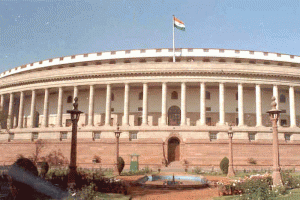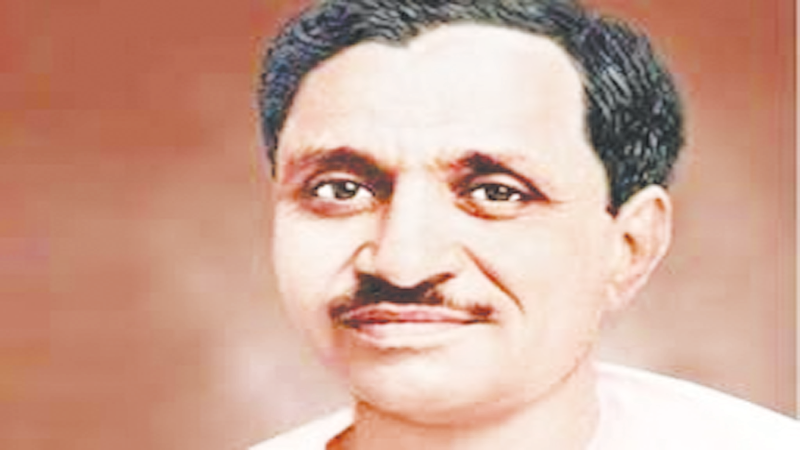Deendayal Upadhyaya
INDIAN politics cannot be thought apart from the culture and philosophy of life of this country. Indian culture is integrationist. In spite of accepting the superficial differences in the various parts of the world and in various aspects of life it seeks their internal unity and synthesizes them. Both socialism and democracy are the results of class struggle. Although the objective of both is to end this struggle and establish unity the way they have adopted for this purpose has only changed the form of these classes, not ended them, and hence this struggle has become more acute.
Democracy held that the struggle between the King and the Subjects is eternal and therefore it put an end to the King. But a struggle between the different classes of the people has been permanently accepted by democracy. Socialism made the struggle between the haves and the have-nots its basis. The classes changed but the struggle did not end, because all systems of thought of the West spring from Darwin’s theory of survival of the fittest. The world goes on not because of strife but because of synthesis and cooperation.
The world is created and continues not because of the conflict between ‘Purush’ and ‘Prakriti’ but because of their inter-dependence. Hence all actions should be discussed and analysed not on the basis of class struggle and class antagonism but on the basis of interdependence, complementariness and mutual cooperation.
PEOPLE MAKE PARTIES
If you are a democrat do not be dictated by anybody but your conscience. Political parties that stand for the people also stand on the strength of the people. If the people want that nobody should bend them the people should lend them their strength. It is the people who are the architects of political parties, and through them of their political destiny.

A GOOD PARTY
Which is a good party? Evidently the one that is not simply a collection of individuals but is a body corporate with a distinctive purposeful existence different from its desire to capture power. Political power should be a means rather than an end to the members of such a party. There should be devotion to a cause in the rank and file of the party. Devotion leads to dedication and discipline. Discipline does not mean simply outward conformity to certain do’s and dont’s. The more you impose discipline from above the less is the internal strength of the party. Discipline is to a party what Dharma is to a society.
PHILOSOPHY FOR POLITICAL PARTIES
Let the different political parties try to evolve a philosophy for themselves. Let them not be mere conglomerations of persons joined together for some selfish ends. It should be something different from a commercial undertaking or a joint stock company. It is also necessary that the philosophy of the party is not kept confined to the pages of the party manifesto. Members should understand It and devote themselves to translating it into action.
THE QUESTION OF DISCIPLINE
The question of discipline in the rank of a party is important not only to keep the party in perfect health but also because of its bearing on the conduct of the people in general. A government is primarily an instrument of conservation and protection and not of destruction, or change. To inculcate a reverence for law in the people demands that the parties who aspire to be guardians of law should themselves set an example in this direction. The essence of democracy is a spirit of, and capacity for, self-governance. If the parties cannot govern themselves how can they hope to create in the community a desire for self-governance?
While on the one hand it is essential for the community to guarantee and protect individual freedom it is desirable on the other hand, for the individual to willingly submit to the general will. The greater this submission the less will be the coercive power of the State. In a party whose affairs are regulated not by any state law but by the decisions voluntarily accepted by the party units, one can set an example of how best individual freedom and social responsibility can be balanced.
It is, therefore, necessary for the parties to prescribe a code of conduct for their members and to strictly follow it.
DUTY OF ELECTORATE
A bad candidate cannot claim a premium just because the party he belongs to is good. An evil is an evil and, like the proverbial ill-wind, cannot blow good to anyone anywhere. The party High Command in giving a ticket to such a man might have acted on a partisan basis or, with the best of intentions, it might have committed an error of judgment. It is the duty of a responsible electorate to rectify such a mistake.
VOTE IS A MANDATE
PEOPLE should also realise that a vote is not an instrument of expressing gratefulness to any candidate but a mandate to carry out their wishes.
MINORITY PHOBIA
FRANK Anthony maintains that English should find a place in the Constitution because it is the language of a minority i.e. the Anglo-Indians. If Shri Anthony feels as a national he should cease to think in terms of minorities and majorities. After all, this dichotomy has a restricted purpose in parliamentary democracy. We cannot extend It to plague our entire national life. If we do so there will be a number of minorities as we go on changing our basis of classification, with the result that everybody will belong to some minority or other. here can be religious minorities, linguistic minorities, political minorities, racial minorities, occupational minorities and so on.
(Excerpts from the book – “Pandit Deendayal Upadhyaya A Profile” edited by Sudhakar Raje.)


